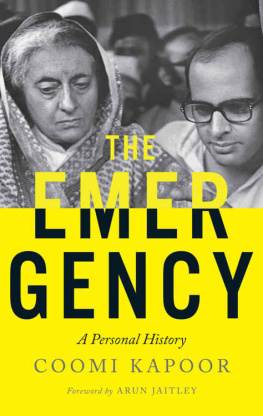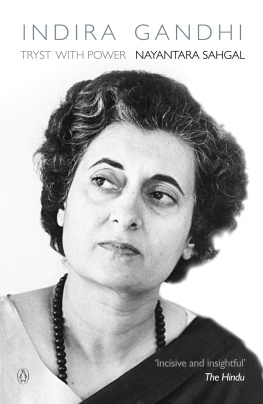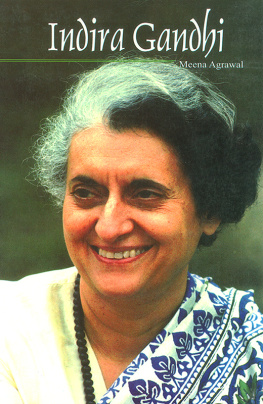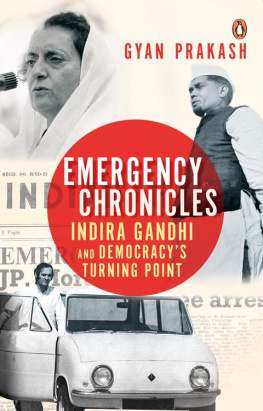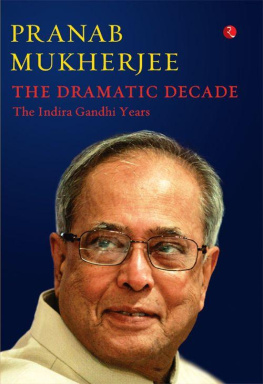
COOMI KAPOOR
THE EMERGENCY
A Personal History

PENGUIN BOOKS
Contents
To my husband, Virendra, and countless others who stood up to challenge Indira Gandhis Emergency
Foreword
This book is an invaluable record of one of the darkest periods in the history of independent India, grippingly recounted by Coomi Kapoor. My own memories of that period are vivid and indelible since, like Coomi, I too was personally affected by the Emergency.
It all began forty years ago, in June 1975. On 12 June 1975 three significant developments took place. First arrived the news that one of Indira Gandhis closest advisers, D.P. Dhar, had died. Then came the results of the Gujarat Assembly electionsthe Congress had lost to a combined opposition, which was led by Morarji Desai. In the early afternoon came the final shock: the election petition against Indira Gandhi, filed by the socialist leader Raj Narain, was allowed by the Allahabad High Court. Justice Jagmohanlal Sinha held that the election had been vitiated on several counts, among them using the services of a public servant in the campaign and spending money in excess of the permitted amount. With that judgment, Indira Gandhi was unseated from her membership of the Lok Sabha.
The economy was doing badly. The government was perceived to be a non-performer. The Opposition was closing ranks while Jayaprakash Narayan (JP) had already been leading a student and youth agitation against the government. Clearly, the pressure was building up for Indira Gandhi to quit. She preferred to file an appeal in the Supreme Court. The vacation judge, Justice V.R. Krishna Iyer, admitted an appeal and passed the usual interim order that she could attend the House but not vote, nor could she draw her salary as a member of Parliament (MP). She could speak as the prime minister but not as an MP.
JP convened a meeting of all the opposition leaders at the Gandhi Peace Foundation at Delhis Rouse Avenue (now called Deen Dayal Upadhyaya Marg). As convenor of the Sangharsh Samiti for student and youth organizations, appointed by JP, I attended this meeting, as well as others held by JP at this time. On the evening of 25 June 1975 a huge rally was held at the Ram Lila Maidan. An all-India satyagraha was announced, which would start from 29 June.
I returned home late in the evening on 25 June. At about 2 a.m., when I was fast asleep, the doorbell rang. The police were at the door. My father, a practising lawyer, got into an argument with themthere was neither an FIR nor any detention order against me; how then could they arrest me and take me to the police station? While he engaged them in a dialogue, I made good my escape from the rear door and woke up a friend in the neighbourhood. I spent the remaining hours of the night at his house. By sunrise I started calling up some friends in the Akhil Bharatiya Vidyarthi Parishad (ABVP), the student wing of the Bharatiya Jana Sangh. News was coming in that all the senior opposition leaders had been picked up from their residences. No newspapers had come out that morningthe electricity supply to Bahadur Shah Zafar Marg, from where most papers were published, had been cut off the previous evening. After an early, hurried breakfast, I left for the Delhi University campus. I felt we must stage a protest against the arrest of our leaders and the closing down of newspapers. By about 10 oclock we had collected around 200 ABVP members. We went from college to college, where the admission season was on, and teaching had been suspended on account of summer vacations. We finally arrived at the coffee house behind the vice-chancellors office.
I delivered a speech there to protest against the arrest of senior leaders and the closure of the newspapers. By this time hundreds of policemen, led by the then deputy inspector general of Delhi Police, P.S. Bhinder, had surrounded us. I requested my friends to leave since I alone would get arrested and the others could then continue to organize the protest. As expected, I was arrested and taken to the Civil Lines police station. At the police station I heard a news broadcast on All India Radio: Emergency had been proclaimed in the country, press censorship had been imposed, senior leaders had been arrested and fundamental rights had been suspended. It was then that I realized that we were staring at a dictatorship. There was no clarity as to how long the Emergency would last. The police served me a detention order under the Maintenance of Internal Security Act (MISA). It was a blank detention order already signed by an additional district magistrate, and only later were details such as my fathers name and my address filled up. At the Civil Lines police station I also learnt that throughout the previous night a lot of activity had taken place there. Morarji Desai, JP and many other senior opposition leaders had been arrested from their homes and brought there before being sent to different jails in north India. Among the arrested were also two Congress leaders, Chandra Shekhar and Ram Dhan, who were believed to be close to JP.
In the early evening, I was driven from Civil Lines police station to Delhis Tihar jail, where I joined a group of detainees in Ward No. 2 of the jail. The detainees included local politicians of the Jana Sangh, the Congress(O) led by Morarji Desai, the Swatantra Party and some old socialists from different Lohiaite groups. There were also some Anand Margis, ultra-left Naxalite activists, teachers from Delhi University and members of the Jamaat-e-Islami. A kitchen was being set up in the ward for the detainees. By the evening a suitcase containing my clothes arrived from home. I was a student of the LLB course at the Delhi University Law Faculty, and was also the president of the Delhi University Students Union (DUSU). I had completed my second-year law exams and still had one year to go before I could become a lawyer.
The daily allowance for other detainees under the rules framed under MISA was three rupeesbreakfast, lunch and dinner all had to be managed within this money. Newspapers and transistors were not allowed. Interviews and meetings with relatives were also not allowed. After a week, twenty of us were summoned with our baggage to the jail office and driven in a Black Maria, the jail van, to the Ambala central jail. Bansi Lal, the then chief minister of Haryana, had the reputation of being tough and ruthless, and Haryana jails were the strictest ones. I spent the next three months in Ambala jail, before I fortuitously got transferred back to Delhi. Seven false cases had been registered against me for participating in different agitations, and I was being summoned for these by the criminal courts in Delhi. One of the magistrates insisted on my presence and therefore, under a court order, I found myself back in Tihar jail.
Political developments during this period were all aimed in the direction of suppressing democracy and turning India into a totalitarian state. Fundamental rights under Articles 14, 19, 21 and 22 were suspended. Further, the Supreme Court, by a majority of four against one upheld the plea of the government that even illegally detained persons had no right to move a court. The then attorney general, Niren De, had argued that even if a detainee was unlawfully deprived of his right to life, there was no remedy in law as long as the Emergency was promulgated. The newspapers quickly began to toe the government line, with only the Indian Express and the Statesman offering some resistance. Indira Gandhis election appeal was allowed by the Supreme Court primarily on the ground that Parliament had amended the election law retrospectively and corrected the illegality by a legislative amendment. Every corrupt practice that she had committed for which her election had been set aside thus ceased to be a corrupt practice. As most opposition MPs had been detained under MISA, there was no opposition in Parliament to any of these questionable changes. The media was prohibited even from reporting parliamentary proceedings.
Next page
